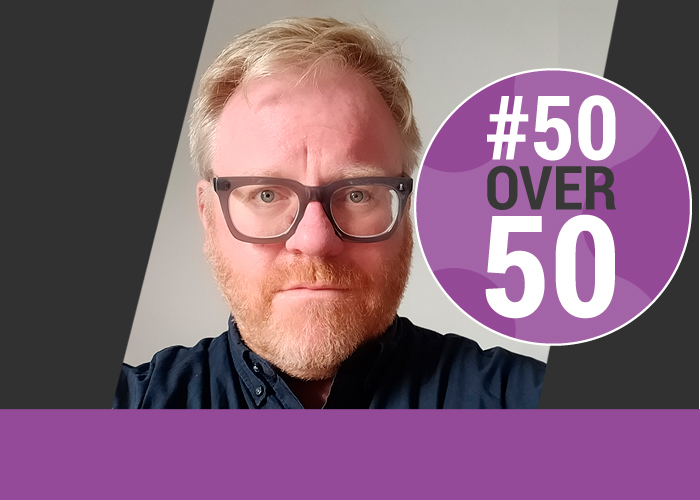#50over50: Scott Guthrie

About the author
Richard Bailey Hon FCIPR is editor of PR Academy's PR Place Insights. He teaches and assesses undergraduate, postgraduate and professional students.

Scott Guthrie on the business of influence
The Business of Influence is already taken as a title (Philip Sheldrake used it for his ahead-of-its-time 2011 book that proposed a new focus for public relations), but it perfectly summarises Scott Guthrie’s past experience and present area of expertise.
This English Literature graduate, who later gained an MBA, who has worked in television and newspapers, on the commercial side of the Press Association and PR Newswire, as a chief marketing officer in the insurance sector, in change management and in public relations consultancy, is now an acknowledged expert in the emerging field of influencer marketing.
He has contributed an insightful chapter on virtual influencers for a new textbook on Influencer Marketing, and demonstrates his covert influence in this area when the joint editors, early on, acknowledge the difference between influencer marketing (short-term, paid promotions) and influencer relations (using unpaid earned and shared media). This is one of the themes he consistently addresses in his well-regarded blog and podcast.
Reflecting on the challenges of writing a textbook about this developing field, he observes:
Academics look at academic sources, and practitioners tend to look at what’s happening in practice. There needs to be a bridge, and there isn’t a bridge at the moment.
But how did a middle aged man become such an expert commentator on lip-synching and dancing teenage girls, I wonder?
‘I was invited in late summer of 2019 to talk at a conference in Italy on unconscious bias in marketing. I opened my keynote by posing this same question: what right does a middle-aged, white, overweight, privately-educated man have to talk about unconscious bias? This answer is: I don’t have any right – except to ask the question: shouldn’t we all be looking at it? I have no right more than anybody else, but I do have half a century of experience and reading and thinking – and have a more rounded view. I have the academic rigor and the lived experience to look at influencer marketing from a different point of view.’
This perspective developed over time.
‘I left PR Newswire in around 2006 as newswire product manager EMEA,’ he recalls. ‘Latterly, I’d noticed that people were more interested in accessing websites and databases than the newswire service. This was the pivotal time for the shift from mediated to direct to consumer content, hence my emerging interest in influencer relations.’
‘I’d later on moved to Australia to fulfil a promise to my partner, but despite my experience and my MBA, I struggled to find work. At that time, I read a Fast Company article by the management thinker Tom Peters: The Brand Called You. A story about personal branding? Nothing new there, you say? Well, it was published in 1997, a year before Google was born. This resonated with me at the time. Peters wrote:
Regardless of age, regardless of position, regardless of the business we happen to be in, all of us need to understand the importance of branding. We are CEOs of our own companies: Me Inc. To be in business today, our most important job is to be head marketer for the brand called You.
Tom Peters
Fast Company article‘We’ve all got a point of view, and social media now allows us to share that point of view on a global basis rather than just at the coffee machine or in the pub. That’s what I still do today. I work discreetly with senior people in insurance and professional services – people with great depth of subject matter expertise – and I help them scale that expertise via platforms like LinkedIn and Twitter and blogs and by helping them develop thought leadership articles for the vertical and regional media. It’s about growing that personal influence.’
Guthrie had previously held a senior management role in the insurance sector. ‘I learnt a lot about governance and how to run companies. I’m very words-driven, but my co-directors only wanted numbers and they favoured staccato sentences.’
He later worked in change management and as a consultant specialising in influencer relations.
‘In 2020, influencer marketing became legitimised as a comms channel. The Finnish government reclassified influencers as key workers because of their ability to reach those who do not read the traditional media. If we let the marketers own this field, it becomes about selling more toothpaste, but at its core influencer marketing is about effecting change.’
I often guest lecture on influencer marketing. The Q&A sessions frequently run for longer than the lectures, showing the level of interest in this topic.
‘A big emerging trend is that we’ll stop thinking of games as the realm of spotty adolescent boys. 66% of new gamers are female. 56% of new gamers are over 45 years of age (according to Global Web Index). Gaming is fundamentally changing how people interact with each other and the internet overall. In 2020 people were unable to connect face-to-face in the real world during the global pandemic. They turned, instead, to build connections in digital realms. Gaming became a directed activity to help us better communicate with friends. Increasingly games provide a virtual shared space where all consumer digital activities happen. Think: socialising, shopping, live events and online search opportunities.’
The online world has come of age; it’s real now, rather than virtual. This is surely one big lesson we’ve learned from the pandemic. While the principles of influence may not be new, in practice we’re all much more aware of the power to influence and to be influenced.
If you need someone to guide you through this, I recommend Scott Guthrie.